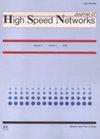无线网状网络中六种网状路由器替换方法的性能评价:考虑网状客户端两岛分布的中小型网络的比较研究
IF 1
Q4 COMPUTER SCIENCE, INFORMATION SYSTEMS
引用次数: 0
摘要
本文提出了一种用于无线网状网络(WMNs)中网状路由器优化的混合智能仿真系统WMN-PSOHCDGA。我们实现了CM、RIWM、LDIWM、LDVM、RDVM和FC-RDVM六种网格路由器替换方法,并考虑了网格客户端的Two island分布。我们对这些路由器替换方法在小型和中型WMNs上进行了比较研究。我们通过计算机模拟来评估性能。仿真结果表明,对于中小型wmn, 6种方法在连通性和覆盖指标方面都有较好的性能。但是,它们在负载平衡方面有不同的行为。对于小规模wmn, LDIWM、RIWM和FC-RDVM的负载均衡优于CM、LDVM和RDVM。而LDIWM、RIWM和FC-RDVM比较,LDIWM具有更好的负载均衡。我们发现小规模WMNs的负载均衡性能并不好,因为在某些区域存在网状路由器的集中。对于中等规模的wmn, CM、LDIWM、LDVM和RDVM的负载均衡性能不佳。而RIWM和FC-RDVM具有更好的性能。比较RIWM和FC-RDVM,我们发现FC-RDVM的负载均衡优于RIWM。本文章由计算机程序翻译,如有差异,请以英文原文为准。
Performance evaluation of six mesh router replacement methods for wireless mesh networks: A comparison study for small and middle scale networks considering two islands distribution of mesh clients
In this paper, we present a hybrid intelligent simulation system for optimization of mesh routers in Wireless Mesh Networks (WMNs) called WMN-PSOHCDGA. We implemented six mesh router replacement methods: CM, RIWM, LDIWM, LDVM, RDVM and FC-RDVM and consider Two Islands distribution of mesh clients. We carry out a comparison study of these router replacement methods for small and middle scale WMNs. We assessed the performance by computer simulations. The simulation results show that six methods have a good performance for connectivity and coverage metrics, for both small and middle scale WMNs. However, they have different behavior for load balancing. For small scale WMNs, the load balancing of LDIWM, RIWM and FC-RDVM is better than CM, LDVM and RDVM. While, comparing LDIWM, RIWM and FC-RDVM, the LDIWM has better load balancing. We found that the load balancing for small scale WMNs is not good, because there is a concentration of mesh routers in some areas. For middle scale WMNs, the CM, LDIWM, LDVM and RDVM have not a good load balancing. While, the RIWM and FC-RDVM have better performance. Comparing RIWM and FC-RDVM, we found that the load balancing of FC-RDVM is better than RIWM.
求助全文
通过发布文献求助,成功后即可免费获取论文全文。
去求助
来源期刊

Journal of High Speed Networks
Computer Science-Computer Networks and Communications
CiteScore
1.80
自引率
11.10%
发文量
26
期刊介绍:
The Journal of High Speed Networks is an international archival journal, active since 1992, providing a publication vehicle for covering a large number of topics of interest in the high performance networking and communication area. Its audience includes researchers, managers as well as network designers and operators. The main goal will be to provide timely dissemination of information and scientific knowledge.
The journal will publish contributed papers on novel research, survey and position papers on topics of current interest, technical notes, and short communications to report progress on long-term projects. Submissions to the Journal will be refereed consistently with the review process of leading technical journals, based on originality, significance, quality, and clarity.
The journal will publish papers on a number of topics ranging from design to practical experiences with operational high performance/speed networks.
 求助内容:
求助内容: 应助结果提醒方式:
应助结果提醒方式:


